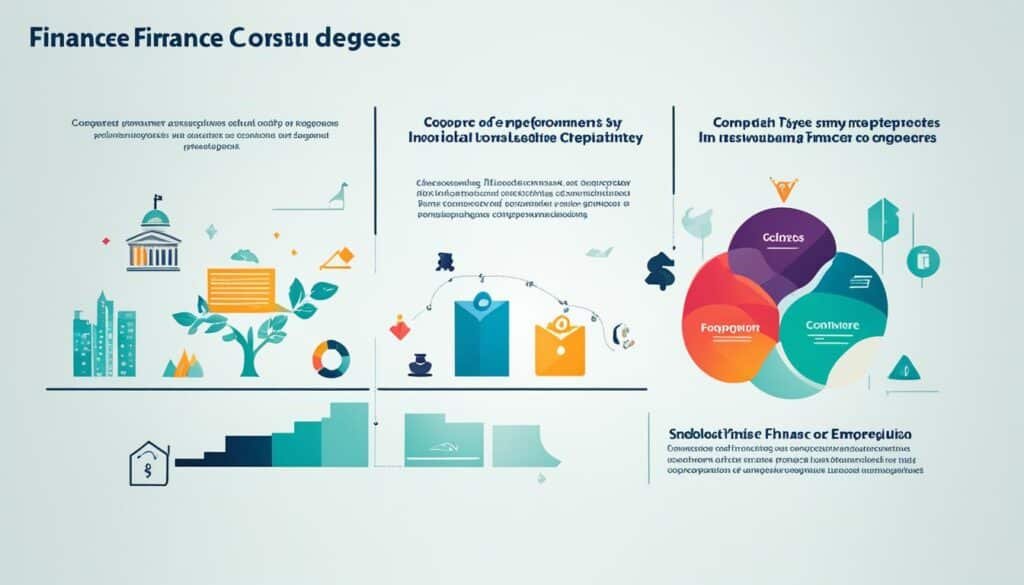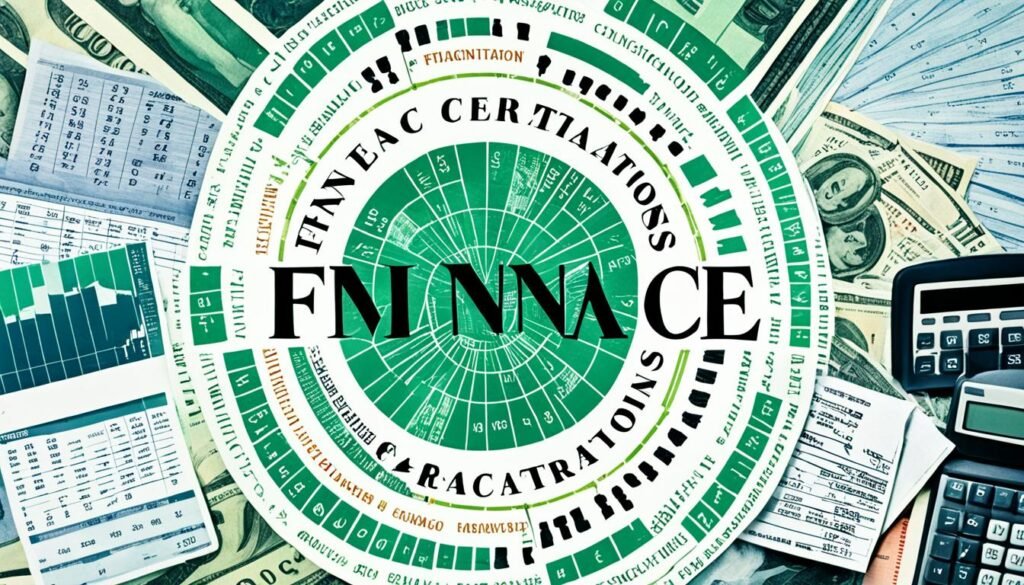When it comes to pursuing a career in the dynamic field of finance, the choice of degree program can have a significant impact on your future success. The finance degree landscape offers a diverse array of options, each catering to different academic interests, career aspirations, and personal circumstances. Whether you’re a graduate seeking to enhance your financial expertise or an undergraduate exploring your educational and professional pathways, navigating the vast landscape of finance degree programs can be a daunting task.
This comprehensive article aims to guide you through the process of comparing and selecting the finance degree program that best aligns with your goals. From bachelor of science (BS) in finance to corporate finance and online finance degree options, we’ll explore the key considerations, including program types, concentrations, accreditation, financial aid, and the advantages of online learning. By the end of this article, you’ll be equipped with the knowledge to make an informed decision about your academic and professional future in the dynamic field of finance.
Key Takeaways
- The finance degree landscape offers a diverse array of options, including bachelor’s and master’s programs, with various concentrations to choose from.
- Accreditation, financial aid, and online learning opportunities are crucial factors to consider when selecting a finance degree program.
- Concentrations within finance degree programs allow students to tailor their education towards specific career paths, such as investment management, banking, or risk management.
- Admission requirements for finance programs typically include GPA, test scores, letters of recommendation, and a personal statement or essay.
- Comparing finance degree programs can help you find the best fit for your academic interests, career goals, and personal circumstances.
Introduction to Finance Degree Programs
Pursuing a finance degree can be a rewarding and lucrative path for those seeking to play a crucial role in the financial health of individuals, organizations, and the broader economy. Finance professionals are responsible for handling money, analyzing financial data, and providing decision-influencing advice that shapes the financial well-being of their clients and employers. Whether you’re interested in corporate finance, investment management, or any other specialized field within the finance degree program, this academic discipline offers a wide range of career opportunities and the chance to make a tangible impact.
Why Consider a Finance Degree?
A finance degree equips students with the knowledge and skills necessary to navigate the complex world of financial markets, institutions, and decisions. By studying topics such as financial statements, investment strategies, risk management, and financial planning, finance majors develop a deep understanding of the financial factors that drive business success and personal wealth. This expertise is highly valued by employers across various industries, from banking and financial services to corporate finance and financial analysis.
Career Opportunities in Finance
The finance degree program prepares students for a wide range of career paths, including roles as financial analysts, personal financial advisors, financial managers, financial examiners, and financial risk specialists. These professionals play a vital role in shaping the financial decisions and strategies of individuals, businesses, and even entire economies. With a finance degree, graduates can explore opportunities in fields such as investment management, banking and financial services, corporate financial planning, risk management, and financial analysis.
Demand for Finance Professionals
According to the Bureau of Labor Statistics, employment in finance-related occupations is projected to grow faster than the average for all occupations in the U.S. The demand for skilled finance professionals is driven by the need for expert financial advice, sound investment strategies, and risk management solutions across various industries. Earning a finance degree can open the door to a fulfilling and lucrative career, with opportunities for career advancement and the chance to make a tangible impact on the financial world.
| Key Factors to Consider when Choosing a Finance Degree | Explanation |
|---|---|
| Accreditation | Ensure the finance degree program is accredited by recognized organizations, such as the Accreditation Council for Business Schools and Programs (ACBSP) or the Association to Advance Collegiate Schools of Business (AACSB). |
| Concentration Options | Look for finance degree programs that offer specialized concentrations, such as investment management, corporate finance, risk management, or financial planning, to align with your career goals. |
| Delivery Format | Consider whether you prefer an on-campus, online, or hybrid finance degree program to accommodate your learning style and lifestyle. |
| Financial Aid and Scholarships | Explore the availability of financial aid and scholarship opportunities to make your finance degree more accessible and affordable. |
Types of Finance Degrees

When considering a finance degree, students have two primary options: the Bachelor of Science (BS) in Finance and the Bachelor of Arts (BA) in Finance. Each program offers unique advantages and focuses, allowing learners to tailor their finance degree program to their specific educational and career goals.
Bachelor of Science (BS) in Finance
The BS in Finance is the most common and widely recognized finance degree program. This degree typically emphasizes quantitative analysis, financial modeling, portfolio management, and corporate financial planning. Students pursuing a BS in Finance will gain a strong foundation in accounting, economics, statistics, and advanced finance concepts. This program prepares graduates for careers in corporate finance, investment management, financial analysis, and financial services.
Bachelor of Arts (BA) in Finance
The BA in Finance offers a more well-rounded, liberal arts-based approach to finance education. While still covering core finance topics, the BA program also incorporates general education courses in the humanities, social sciences, and communication. This broader curriculum equips students with critical thinking, problem-solving, and interpersonal skills that can be beneficial in various finance career paths, including personal financial planning, wealth management, and financial consulting Ultimately, the choice between a BS or BA in Finance will depend on a student’s academic interests, career aspirations, and the specific program offerings at their preferred business schools and programs. Both degree paths can lead to rewarding finance careers and open doors to various opportunities in the dynamic field of finance.
Finance Degree Programs

When it comes to pursuing a career in the finance industry, individuals have a wide range of degree program options to consider. From undergraduate to graduate-level offerings, the field of finance provides students with numerous pathways to develop the necessary financial skills and knowledge to succeed in various finance careers.
At the undergraduate level, a Bachelor of Science (BS) in Finance is a popular choice, offering a comprehensive curriculum that covers principles of finance, financial analysis, investment strategies, and corporate financial planning. These programs typically include business core courses as well as finance-specific courses, preparing students for jobs in finance such as financial analyst, financial manager, or personal financial advisor.
For those seeking a more liberal arts approach to finance, the Bachelor of Arts (BA) in Finance may be a suitable option. While still providing a solid foundation in finance, the BA program often incorporates more general education courses and electives, allowing students to explore interdisciplinary interests and develop a well-rounded understanding of the financial world.
In addition to undergraduate programs, graduate-level offerings such as the Master of Business Administration (MBA) in Finance and the Master of Science (MS) in Finance are available for those seeking to deepen their financial expertise and career opportunities. These programs typically delve into advanced finance topics, including financial risk management, investment management, and corporate financial planning.
Regardless of the specific finance degree program, students can expect to gain a comprehensive understanding of financial markets, financial decisions, and financial institutions, as well as the ability to analyze financial statements, evaluate investment opportunities, and provide strategic financial advice to individuals and organizations.
| Degree Program | Focus Areas | Career Paths |
|---|---|---|
| Bachelor of Science (BS) in Finance |
|
|
| Bachelor of Arts (BA) in Finance |
|
|
| Master of Business Administration (MBA) in Finance |
|
|
| Master of Science (MS) in Finance |
|
|
By carefully considering their career goals, educational interests, and financial aspirations, prospective students can navigate the diverse landscape of finance degree programs and find the best fit to launch their finance career.
Concentrations Within Finance Degree Programs

A finance degree program often allows students to specialize in a specific area of the field, known as a concentration. These concentrations enable finance degree seekers to tailor their education and develop expertise in the financial discipline that aligns best with their career aspirations. Some of the popular concentrations within finance degree programs include:
Investment Management
The investment management concentration focuses on investment strategies, portfolio management, financial markets, and wealth management. Students explore topics such as security analysis, derivatives, and alternative investments, preparing them for careers as financial analysts, portfolio managers, and investment advisors.
Banking and Financial Services
The banking and financial services concentration provides a comprehensive understanding of the financial services industry, including commercial banking, retail banking, and financial planning. Coursework covers areas like financial institution management, consumer lending, and personal financial planning.
Corporate Finance
The corporate finance concentration emphasizes financial decision-making and strategic planning within organizations. Students delve into topics like capital budgeting, financial modeling, mergers and acquisitions, and corporate financial management, equipping them for roles as financial managers, financial analysts, and corporate financial planners.
Risk Management and Insurance
The risk management and insurance concentration focuses on identifying, analyzing, and mitigating financial risks faced by individuals and organizations. Coursework covers areas such as risk assessment, insurance products, and derivatives trading, preparing students for careers in corporate risk management, insurance underwriting, and financial risk analysis.
Real Estate
The real estate concentration explores the financial aspects of the real estate industry, including property valuation, real estate investment, and real estate finance. Students gain expertise in areas like mortgage financing, commercial real estate, and real estate portfolio management, equipping them for roles in real estate investment, property management, and real estate lending.
By choosing a concentration, finance degree students can develop specialized knowledge and skills that can enhance their career opportunities in the dynamic and diverse field of finance.
Admission Requirements for Finance Programs
When applying to finance degree programs, prospective students should be aware of the key admission requirements that universities typically consider. These criteria help institutions evaluate an applicant’s academic preparedness and potential for success in the field of finance.
GPA and Test Score Requirements
Many finance degree programs, both at the undergraduate and graduate levels, have minimum GPA and standardized test score requirements. For example, a bachelor’s in finance may require a cumulative GPA of 3.0 or higher, along with competitive scores on the SAT or ACT. Similarly, a master’s in finance could necessitate a GPA of 3.5 or above, as well as strong performance on the GMAT or GRE.
Letters of Recommendation
In addition to academic credentials, finance programs often request letters of recommendation from professors, employers, or other professional references. These letters provide insight into an applicant’s character, work ethic, and potential for success in the field of finance. Applicants should carefully select recommenders who can speak to their relevant skills, experiences, and qualities that align with the program’s goals.
Personal Statement or Essay
Many finance degree programs require applicants to submit a personal statement or essay as part of the admissions process. This allows the admissions committee to gain a better understanding of the applicant’s motivations, career aspirations, and fit for the program. Applicants should use this opportunity to highlight their unique experiences, demonstrate their passion for finance, and explain how the program will help them achieve their professional objectives.
Also Read: Mastering Your Money: Top Personal Finance Tips For Success
Conclusion
Comparing finance degree programs is a crucial step in finding the right fit for your educational and career goals. It’s essential to thoroughly research and evaluate various programs based on factors such as accreditation, curriculum, faculty expertise, and alumni success. Consider your preferences regarding program format, whether it’s traditional on-campus learning, online education, or a hybrid model, to ensure it aligns with your lifestyle and learning style. Additionally, assess the program’s resources, such as internship opportunities, networking events, and career services, as these can greatly enhance your educational experience and post-graduation prospects. Furthermore, evaluate the program’s reputation and rankings within the finance industry, as this can influence how potential employers perceive your credentials. Don’t forget to consider practical aspects like tuition costs, financial aid availability, and geographic location when comparing programs. Ultimately, the right finance degree program for you will be one that offers a comprehensive education, opportunities for hands-on learning and professional development, and a supportive community that will help you thrive academically and professionally. By carefully weighing these factors and finding the program that best aligns with your aspirations, you can set yourself up for success in the dynamic and rewarding field of finance.
FAQs
Q: What is the importance of comparing finance degree programs?
A: Comparing finance degree programs helps you find the one that best fits your career goals, learning style, and financial situation.
Q: How can I find an accredited online finance degree program?
A: You can search for accredited online finance degree programs on official accreditation websites or check with universities directly to ensure the program meets quality standards.
Q: Can I transfer credits from previous education towards my finance degree?
A: Many online finance degree programs allow you to transfer credits from previous education, which can shorten the time it takes to earn your degree and save money on tuition.
Q: What certifications can I earn through a finance degree program?
A: Depending on the program, you may have the opportunity to earn certifications such as Certified Financial Planner (CFP) or other industry-specific credentials that can enhance your career prospects.
Q: How can a finance degree help me start a career in finance?
A: A finance degree provides you with the knowledge and skills needed to pursue various roles in the finance industry, such as financial analyst, investment banker, or financial advisor.
Q: Do online finance degree programs offer financial aid?
A: Many online finance degree programs offer financial aid options such as scholarships, grants, and loans to help students manage tuition costs and make education more accessible.
Q: What types of courses can I expect to take in a finance degree program?
A: Finance degree programs typically include courses in financial accounting, economics, business finance, investment analysis, and other topics relevant to the business and finance world.
Source Links
- https://www.bestcolleges.com/business/bachelors/finance/program-guide/
- https://www.usnews.com/best-graduate-schools/compare/business
- https://www.aacsb.edu/insights/articles/2019/07/is-a-specialized-masters-in-finance-right-for-you
